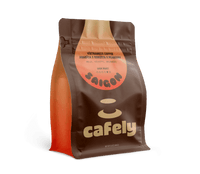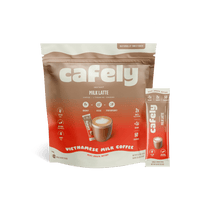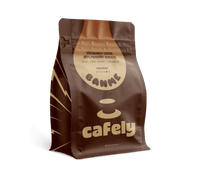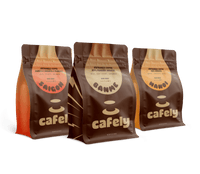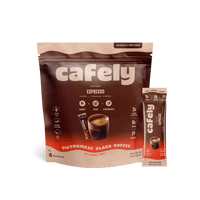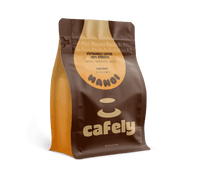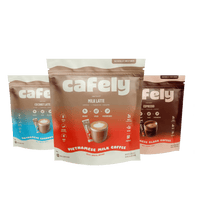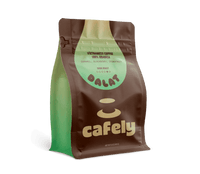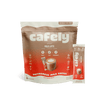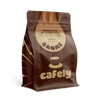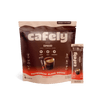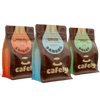Coffee gives you a boost, but it can also bring coffee jitters, crashes, or digestive upset. If you’ve felt wired after one cup too many, you’re not the only one rethinking your routine.
That’s why mushroom coffee is getting attention, especially Ryze. It blends adaptogenic mushrooms with a small dose of real coffee.
But does Ryze mushroom coffee have caffeine? And if so, how much?
You’re about to find out exactly what’s in Ryze, how it compares to your regular brew, and why it feels different in your system.
🔥 For an even stronger, adaptogen-boosted instant coffee, check out Cafely's Vietnamese Coffee 2.0! 🔥
Does Ryze Mushroom Coffee Have Caffeine: The Direct Answer
Ryze mushroom contains organic arabica coffee, shade-grown and lightly roasted, with around 48 mg of caffeine per serving. That’s a little over half the caffeine in an average 8-oz cup of drip coffee, which has about 95 mg.
Ryze doesn't rely on caffeine alone to deliver energy. Instead, it uses a blend of six functional mushrooms, Cordyceps, Lion's Mane, Reishi, Turkey Tail, Shiitake, and King Trumpet, plus organic MCT oil and coconut milk. Each ingredient plays a role in delivering calm, focused, and without the crash.
The goal isn’t to remove caffeine but to balance it.
Why the Caffeine Level Is Lower by Design
Ryze chose a mid-level caffeine dose on purpose. At 48 mg, you get mild stimulation, enough to feel alert but not overstimulated.
The lower caffeine is ideal for people trying to:
- Cut back from high-caffeine coffee options
- Reduce afternoon crashes
- Avoid sleep disruption
- Still keep a morning ritual
Because the mushrooms support focus, energy, digestion, and stress response, the smaller caffeine dose feels smoother than you’d expect.
Cordyceps, for example, supports oxygen use and endurance. Lion’s Mane supports mental clarity. Reishi helps regulate stress hormones.
This synergy is what makes Ryze different from regular coffee. It’s not less, it’s rebalanced.
It also makes Ryze a good choice for people gradually reducing caffeine. You still get mushroom coffee's unique flavor, energy, and a warm cup to start your day.
Understanding Caffeine Content in Ryze

If you're used to a strong cup of regular coffee, switching to Ryze might feel like a big change. Ryze doesn’t cut caffeine out entirely, but it doesn’t hit the same way either.
Ryze uses organic arabica beans, shade-grown and roasted to preserve a smooth, lower-acid profile. Arabica naturally contains less caffeine than robusta beans, which explains part of the drop.
Comparing Caffeine Metabolism: Ryze vs. Regular Coffee
In traditional coffee, the caffeine spike can hit 30 to 60 minutes after drinking. It peaks fast, especially if you drink coffee on an empty stomach, spiking cortisol and adrenaline. This gives you a jolt, and the effects can last several hours, but you’ll often feel the crash once blood sugar and cortisol levels drop.
With Ryze, the metabolic curve looks different. It’s flatter. You feel awake, but you don’t get the same adrenaline rush. This slower release may come from the way fat (from the added coconut milk and MCT oil) and fiber (from mushrooms) slow down digestion.
MCT oil in particular bypasses normal digestion and is used quickly by the liver, giving you mental energy without raising insulin or blood sugar.
That makes Ryze a good fit if you’re watching your energy dips. It also makes it easier to drink in the afternoon without disrupting sleep, something regular coffee tends to mess with due to its lingering half-life (about 5 to 6 hours).
The Mushroom-Caffeine Combination: How It Affects Energy Levels
Ryze includes seven different mushrooms, and many of them have documented effects on the nervous system and metabolism. When these compounds mix with caffeine, they can shift how your body responds to it.
Cordyceps, for example, increases ATP production, the energy your cells use to function. It may help your body produce more energy naturally, reducing how much you rely on caffeine for stimulation [2].
Lion’s Mane targets the brain. It promotes the growth of nerve cells and may improve mental clarity, especially during tasks that require focus [3]. When you pair this mushroom with caffeine, it creates a smoother type of alertness, more sustained and less scattered.
Reishi and Turkey Tail support the parasympathetic nervous system, the “rest and digest” side [4,5]. They don’t sedate you, but they may reduce overactive stress responses, which helps offset the edgy side of caffeine.
So instead of fighting caffeine’s effects, these mushrooms modulate them.
Where Ryze Fits Into the Caffeine Spectrum
If you’re someone tracking caffeine closely, whether for anxiety, sleep, or health reasons, Ryze lands in the “moderate” category.
Here’s how it compares:
|
Beverage |
Caffeine (per 8 oz) |
|
2–5 mg |
|
|
Green Tea |
25–45 mg |
|
Ryze Mushroom Coffee |
48 mg |
|
47–90 mg |
|
|
Regular Coffee |
90–110 mg |
|
Energy Drinks (avg.) |
80–150 mg |
|
Espresso (1 shot) |
63 mg |
That 48 mg in Ryze is a sweet spot for many people; it’s enough to feel a boost but low enough to avoid triggering over-reliance, tolerance buildup, or caffeine sensitivity.
For those with anxiety or adrenal fatigue, Ryze offers a slower, more predictable experience. You’re less likely to feel overstimulated.
And if you’re cutting back, swapping one cup with Ryze could cut your total daily intake.
Why This Combo Isn’t New: Coffee & Mushrooms Through History
Mixing stimulants with balancing herbs has roots in traditional medicine. Tibetan yak herders brewed cordyceps tea to reduce fatigue at high altitudes [6]. In ancient China, reishi was used to calm the mind and support long-term focus, especially during meditation or study [7].
Coffee itself began as a focus aid. Monks in Ethiopia drank early coffee brews to stay alert during prayer, not for a jolt, but for sustained concentration.
That’s the same energy Ryze aims to recreate. The mushrooms don’t block caffeine — they round out its sharper edges. Instead of chasing stimulation, Ryze supports energy that lasts.
FAQs: Ryze Mushroom Coffee & Caffeine
Got questions about Ryze and how its caffeine compares? Here's what you need to know.
1. Does Ryze Mushroom Coffee Cause Caffeine Withdrawal Symptoms?
You might feel mild caffeine withdrawal symptoms if switching from high-caffeine coffee, but symptoms are often lighter due to Ryze’s lower caffeine content.
2. Can I Drink Ryze Mushroom Coffee If I'm Caffeine Sensitive?
Yes, 48 mg of caffeine is gentler, and the mushrooms may help soften overstimulation.
3. Does the Caffeine In Ryze Affect Blood Pressure Differently Than Regular Coffee?
Lower caffeine and adaptogens may reduce the spike in blood pressure seen with stronger coffee, which is why some people consider using decaf for blood pressure management. [8].
4. How Does the Caffeine In Ryze Interact With the Mushroom Compounds?

The mushrooms buffer caffeine’s effects, leading to smoother energy without a sharp crash.
5. Will I Build Caffeine Tolerance With Ryze Like I Do With Regular Coffee?
Caffeine tolerance can still build, but slower, because the dose is lower and the effects are more balanced. That said, it's important to know your personal caffeine limit and stay within that boundary to avoid adverse effects and lower risk of tolerance.
6. Can I Drink Ryze While Pregnant or Breastfeeding?
Ryze has less caffeine, but you should always ask your doctor before using it during pregnancy or nursing. Mushroom coffee is generally safe, but check with your doctor to be sure.
7. How Does the Caffeine In Ryze Affect Exercise Performance?
It may boost endurance and recovery without the spike-crash cycle of high-caffeine pre-workouts.
8. Does the Caffeine In Ryze Differ from Regular Coffee?
Ryze uses organic arabica beans, but there's no separate extraction; caffeine is naturally present in the beans.
9. How Does Altitude or Brewing Method Affect Ryze's Caffeine Content?
Brewing hotter or longer may slightly raise caffeine levels, but Ryze is pre-measured for consistency.
10. Is the Caffeine In Ryze Sourced from Organic Coffee Beans?
Yes, Ryze uses shade-grown, organic Arabica beans selected for smooth flavor and lower acidity.
References:
- Temple, J. L., Bernard, C., Lipshultz, S. E., Czachor, J. D., Westphal, J. A., & Mestre, M. A. (2017). The safety of ingested caffeine: A comprehensive review. Frontiers in Psychiatry, 8(80).
- Hirsch, K. R., Smith-Ryan, A. E., Roelofs, E. J., Trexler, E. T., & Mock, M. G. (2016). Cordyceps militaris improves tolerance to high-intensity exercise after acute and chronic supplementation. Journal of Dietary Supplements, 14(1), 42–53.
- Docherty, S., Doughty, F. L., & Smith, E. F. (2023). The Acute and Chronic Effects of Lion’s Mane Mushroom Supplementation on Cognitive Function, Stress and Mood in Young Adults: A Double-Blind, Parallel Groups, Pilot Study. Nutrients, 15(22), 4842–4842.
- Saha, T. K., Mariom, Rahman, T., Moniruzzaman, M., Min, T., & Hossain, Z. (2023). Immuno-physiological effects of dietary reishi mushroom powder as a source of beta-glucan on Rohu, Labeo rohita challenged with Aeromonas veronii. Scientific Reports, 13(1).
- Bell, V., Dimitrov, P., & Fernandes, T. (2025). Supporting Neurologic Health with Mushroom Nutrition. Nutrients, 17(9), 1568–1568.
- Zhu, H., Liu, C., & Qian, H. (2022). Pharmaceutical Potential of High-Altitude Plants for Fatigue-Related Disorders: A Review. Plants, 11(15), 2004–2004.
- Plosca, M.-P., Chiș, M. S., Fărcaș, A. C., & Păucean, A. (2025). Ganoderma lucidum—From Ancient Remedies to Modern Applications: Chemistry, Benefits, and Safety. Antioxidants, 14(5), 513.
- Boolani, A., Fuller, D. T., Mondal, S., Wilkinson, T., Darie, C. C., & Gumpricht, E. (2020). Caffeine-Containing, Adaptogenic-Rich Drink Modulates the Effects of Caffeine on Mental Performance and Cognitive Parameters: A Double-Blinded, Placebo-Controlled, Randomized Trial. Nutrients, 12(7), 1922.
